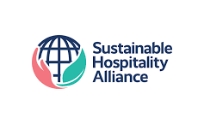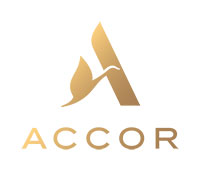
SUSTAINABLE HOSPITALITY ALLIANCE: INDUSTRY-LED HOSPITALITY BENCHMARKING FRAMEWORK TOOL ANNOUNCED
The Sustainable Hospitality Alliance (the Alliance), the leading global network for responsible hospitality publishes a report, in collaboration with EY, outlining a new sustainability benchmarking framework and tool, to track and compare sustainability progress within the Hospitality sector. |
 |
SUSTAINABLE HOSPITALITY ALLIANCE: INDUSTRY-LED HOSPITALITY BENCHMARKING FRAMEWORK TOOL ANNOUNCED
The Sustainable Hospitality Alliance (the Alliance), the leading global network for responsible hospitality publishes a report, in collaboration with EY, outlining a new sustainability benchmarking framework and tool, to track and compare sustainability progress within the Hospitality sector. |
Catégorie : Monde - Économie du secteur
- Chiffres et études
Ceci est un communiqué de presse sélectionné par notre comité éditorial et mis en ligne gratuitement le 24-07-2023
Earlier this year, the Alliance published its Pathway to Net Positive Hospitality, to provide a roadmap for the industry to accelerate action towards a sustainable and contributory future and make this vision a reality.
The Pathway sets out manageable and clear milestones, and provides guidance and tools to measure sustainability performance, supporting hospitality companies to build transparent measurement systems.
The Pathway and this new benchmarking framework tool have been developed as a response to the lack of consistency and harmonisation among sustainability frameworks across the sector, which is increasingly significant.
With a growing awareness of the large ESG footprint of hospitality industry, a number of specialised sustainability frameworks have been developed, which help hotels assess their impact, measure sustainability performance and track their progress.
However, the overwhelming multitude of general and specialised frameworks makes it challenging to navigate, as each one has its own unique set of criteria, metrics, and guidelines for measuring sustainability, creating difficulty for hotels in comparing their performance across different frameworks and understanding their momentum in comparison to the wider industry
Glenn Mandziuk, CEO of the Sustainable Hospitality Alliance, said: “Industry frameworks are created to support the sector’s sustainable progression, however the vast number of these, and the lack of consistency, actually presents more of a challenge than a solution. This results in inconsistency, difficulties in understanding progress and confusion in customers and investors.”
The Sustainable Hospitality Alliance’s new framework and tool simplifies the process - uniting all major hospitality industry and general frameworks within one sustainability tracking and benchmarking tool, to simplify the process. This further advances the industry-led process designed to enable every hotel to work towards a net positive impact, no matter their starting point.
Glenn, said: “The Alliance’s ambition is to reduce complexity and unite the multitude of existing and emerging sustainability frameworks. Both the Pathway itself and this new benchmarking tool will continue to align with existing, as well as, upcoming regulations and initiatives, so that the Pathway can continue to serve as a baseline for further developments and standardisation.”
By joining our collective journey to Net Positive Hospitality and using this new tool to further understand and benchmark their progress, hospitality companies can demonstrate the action they are taking to accelerate towards a more sustainable future - attracting new customers and investors, as well as differentiating themselves from the competition.
Background
How the new Pathway tool (framework) works
To achieve the harmonisation of metrics, the Alliance, along with EY have considered all major hospitality industry and general frameworks and used them as input for the Alliance’s Pathway.
Furthermore, they have conducted a materiality assessment, to make sure they address all relevant sustainability topics within planet, people, place and prosperity dimensions and discussed them in multiple working sessions and surveys with the Alliance’s member hotels, so that nothing and no one is left behind.
The Pathway to Net Positive Hospitality presents an easy-to-use tool with milestones laid as to-accomplish checkboxes, structured in a clear and concise way, so that those in the sector can make sure that, once they have embarked on the well-guided journey to Net Positivity, they can clearly see the steps that need to be taken to ultimately reach the final goal.
Each ESG topic at each maturity stage is described by a list of actionable to-dos or checkboxes. Once the listed measure has been implemented, the Pathway Tool allows users toput a “check” next to it, rating it 1, otherwise 0.
The maturity score then adjusts automatically. The maximum total score a user can achieve is 100%, which would mean, they have achieved net positivity (Stage 4) across all ESG topics by implementing all the listed measures. In the original, non-adjusted version, all ESG topics and maturity stages bear equal contribution to the final score.
This way the Alliance can make sure that, even if the hotel stays at a lower maturity stage overall but is advancing on certain topics and implementing measures from higher maturity stages, it will be reflected in its overall score and will stand out positively during benchmarking.
One can therefore be at different maturity stages for different topics, e.g., be Stage 1 in “Water”, but Stage 2 in “Human rights”, which would mean that the hotel hasn’t yet managed to implement all the listed measures for “Water” at Stage 1, but has done so for the topic “Human rights” at this stage and, thus, advanced to the next stage.
Application of the Pathway tool
The Pathway tool can be applied in four steps depending on data quality and availability. If the data is only available at the corporate level and its quality is low, users can use the tool in the most general way for a rough assessment and to identify data gaps to be closed (Step 1).
In the next step, users can apply regional weighting for consideration of regional relevance (Step 2). If users have access to data at the individual hotel level, they can run the assessment locally to account for regionality (Step 3). The current version of the Pathway tool lists qualitative, rather than quantitative measures and the Alliance is looking into further specifying the measures and introducing quantitative metrics.
Once they have been defined, and provided, and have high-quality quantitative data available at the hotel level, users could run Step 3 once again for more precise results. Subsequently, users can aggregate the collected data to the corporate level (Step 4).
The new framework addresses the question of regional adjustments. When it comes to focusing on relevant ESG topics, companies need to consider its business models and locations they operate in to prioritise what’s most relevant and practicable for their circumstances.
To make the prioritisation possible, the framework includes an option of regional adjustment to the scoring. With the help of this function, businesses can adjust the even score distribution and put more weight on particular ESG topics, most crucial or problematic for the region of operation.
To make sense of a very complex environment, other frameworks have been embedded into this framework, specifically for the Hospitality sector. These can be viewed within the full report, here.
About the Sustainable Hospitality Alliance
The Sustainable Hospitality Alliance brings together engaged hospitality companies and the wider hospitality value chain, along with strategic partners, to address key challenges affecting the planet, people and places around the world.
Through their strategic initiatives and global networks, they develop practical programmes and resources to create a prosperous and responsible hospitality sector that gives back to the destination more than it takes.
Their members represent over 50,000 hotels spanning 270 brands – totalling over 7 million rooms – and include world-leading companies including Accor, Choice Hotels International, Hilton Hotels & Resorts, IHG Hotels & Resorts, Marriott International, and Wyndham Hotels & Resorts, as well as regional brands. Their network also includes other parts of the hospitality value chain, including owners, investors, suppliers, and other partners to further drive joined up action on sustainability, and accelerate the industry on the path to Net Positive Hospitality.
|
|






